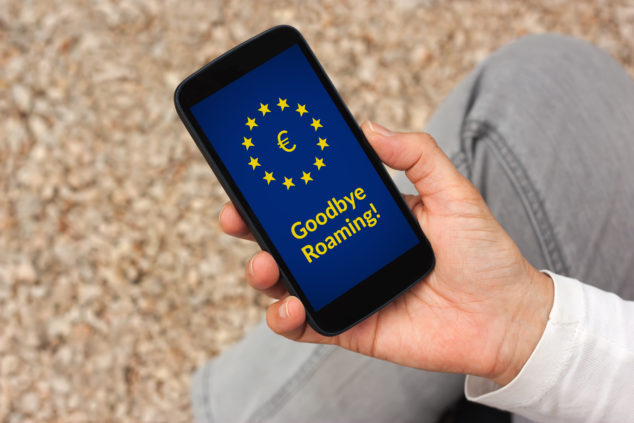National roaming in different countries of the world
Soon domestic roaming in Russia will disappear - FAS and the Ministry of Communications and Mass Media have led the operators to remove this concept from their tariffs. Yota since launching has abandoned the idea of internal roaming.
We learned how things are roaming in other countries, and whether they are going to change something.
In June 2017, domestic roaming was canceled for all customers of European cellular operators. Until this epoch-making moment, prices were steadily falling - in 2007 a law was adopted to reduce tariffs by 60%, and plans to completely abolish additional fees for cellular communications within the EU were repeatedly discussed. Now, uniform prices for communication services - SMS, calls and the Internet are valid not only in the territory of 28 countries of the mainland, but also in the UK, Liechtenstein, Norway and Iceland.
But if the operator can prove that he is losing much in revenue due to the cancellation of roaming, then he has the right to charge an additional commission to his other services.
')
Cellular operators in Finland, Lithuania, Estonia and Slovakia used this chance to keep prices at the same level. As for the Internet, there is no full unlimited, and the data transfer fee depends on the chosen package of services and the country. Considering that even the cheapest fare is three times more expensive than the average one in Russia, the new system is an extra headache for Russians traveling around the European Union: before the trip, they will have to offer offers from operators of different countries to find the most profitable for themselves. For example, it is much cheaper to call from an Italian SIM card than from a German one.

Additional charge for communication between states is not charged - it would seem, you can safely buy a SIM-card and communicate. But internetwork roaming is actively spread: there is fierce competition in the country, there are more than 70 telecom operators in the market, but none of them has national coverage. Its quality varies depending on the state: excellent communication reception on the Atlantic coast, on the Pacific coast - only in California and Washington, and in the central part of the country good communication only in large cities.
At the same time, the prices of various operators are approximately the same, and you will have to pay at least $ 30 a month for mobile communications, which is about 1,800 rubles.
You do not have to pay for intranet roaming, but operators recoup on inter-net calls and the mobile Internet: for example, T-Mobile does not allow free transfer of more than 50 MB of data. And incoming calls are not always free.

In Canada, the most expensive mobile services in North America - a package with voice communication, SMS and 3 GB of the Internet will cost 40 Canadian dollars (approximately 1900 rubles). At the same time, operators offer a wide range of SIM-cards and tariffs for calls and mobile Internet. Domestic roaming in the country was canceled in 2014.
India is the country with the fastest growing telephone network in the world, which now has nearly a billion customers. For the past two years, the communications market has been shaking from consolidating and consolidating the largest players.
There are different price offers in every Indian state, and the quality of coverage is also different. Operators Airtel and Idea have canceled domestic roaming tariffs since April 2017, and Jio, by contrast, is famous for its high prices.
All local SIM cards are valid in India, with the exception of the disputed territory of Jammu and Kashmir. There are only SIM-cards purchased in this state on a prepaid basis. You can only call them, you can not send text messages and use the Internet. In other regions of the country, these cards do not work. This restriction is linked to the threat of terrorism, and recently the Indian authorities extended it to 2018.
Today in China there is a charge for internal roaming, but, as the PRC State Council says, for the sake of "developing national Internet technologies" in the republic, they will soon refuse additional fees from customers located in different provinces, plus the increased rates on the Internet will be canceled.
Three major Chinese mobile operators: China Unicom, China Mobile and China Telecom are going to cancel roaming in October this year and launch 5G networks in test mode.

The conclusions are unambiguous: in almost all large countries, internal roaming as a service is missing, but for small ones it is simply not necessary because of the modest area. But everywhere, operators solve the problem of reimbursement of expenses for this service in different ways: growth of the average price tag, subscription fee, limited Internet and inflated prices for external roaming.
We learned how things are roaming in other countries, and whether they are going to change something.
European Union
In June 2017, domestic roaming was canceled for all customers of European cellular operators. Until this epoch-making moment, prices were steadily falling - in 2007 a law was adopted to reduce tariffs by 60%, and plans to completely abolish additional fees for cellular communications within the EU were repeatedly discussed. Now, uniform prices for communication services - SMS, calls and the Internet are valid not only in the territory of 28 countries of the mainland, but also in the UK, Liechtenstein, Norway and Iceland.
But if the operator can prove that he is losing much in revenue due to the cancellation of roaming, then he has the right to charge an additional commission to his other services.
')
Cellular operators in Finland, Lithuania, Estonia and Slovakia used this chance to keep prices at the same level. As for the Internet, there is no full unlimited, and the data transfer fee depends on the chosen package of services and the country. Considering that even the cheapest fare is three times more expensive than the average one in Russia, the new system is an extra headache for Russians traveling around the European Union: before the trip, they will have to offer offers from operators of different countries to find the most profitable for themselves. For example, it is much cheaper to call from an Italian SIM card than from a German one.

USA
Additional charge for communication between states is not charged - it would seem, you can safely buy a SIM-card and communicate. But internetwork roaming is actively spread: there is fierce competition in the country, there are more than 70 telecom operators in the market, but none of them has national coverage. Its quality varies depending on the state: excellent communication reception on the Atlantic coast, on the Pacific coast - only in California and Washington, and in the central part of the country good communication only in large cities.
At the same time, the prices of various operators are approximately the same, and you will have to pay at least $ 30 a month for mobile communications, which is about 1,800 rubles.
You do not have to pay for intranet roaming, but operators recoup on inter-net calls and the mobile Internet: for example, T-Mobile does not allow free transfer of more than 50 MB of data. And incoming calls are not always free.

Canada
In Canada, the most expensive mobile services in North America - a package with voice communication, SMS and 3 GB of the Internet will cost 40 Canadian dollars (approximately 1900 rubles). At the same time, operators offer a wide range of SIM-cards and tariffs for calls and mobile Internet. Domestic roaming in the country was canceled in 2014.
India
India is the country with the fastest growing telephone network in the world, which now has nearly a billion customers. For the past two years, the communications market has been shaking from consolidating and consolidating the largest players.
There are different price offers in every Indian state, and the quality of coverage is also different. Operators Airtel and Idea have canceled domestic roaming tariffs since April 2017, and Jio, by contrast, is famous for its high prices.
All local SIM cards are valid in India, with the exception of the disputed territory of Jammu and Kashmir. There are only SIM-cards purchased in this state on a prepaid basis. You can only call them, you can not send text messages and use the Internet. In other regions of the country, these cards do not work. This restriction is linked to the threat of terrorism, and recently the Indian authorities extended it to 2018.
China
Today in China there is a charge for internal roaming, but, as the PRC State Council says, for the sake of "developing national Internet technologies" in the republic, they will soon refuse additional fees from customers located in different provinces, plus the increased rates on the Internet will be canceled.
Three major Chinese mobile operators: China Unicom, China Mobile and China Telecom are going to cancel roaming in October this year and launch 5G networks in test mode.

The conclusions are unambiguous: in almost all large countries, internal roaming as a service is missing, but for small ones it is simply not necessary because of the modest area. But everywhere, operators solve the problem of reimbursement of expenses for this service in different ways: growth of the average price tag, subscription fee, limited Internet and inflated prices for external roaming.
Source: https://habr.com/ru/post/338974/
All Articles